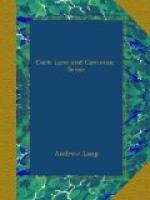There was published at that time a journal called La Table Parlante, which contained recitals of phenomena, correspondence, and so forth. Among the narratives, that of a M. Benezet was typical, and is curious. In recent years, about 1872-80, the Rev. Mr. Stainton Moses, a clergyman and scholar of the best moral reputation, believed himself to be the centre of extraordinary, and practically incredible, occurrences, a belief shared by observers among his friends. M. Benezet’s narrative is full of precisely parallel details. M. Benezet lived at Toulouse, in 1853; and his experiences had for their scene his own house, and that of his relations, M. and Mme. L. The affair began in table-turning and table-tilting: the tilts indicated the presence of ‘spirits,’ which answered questions, right or wrong: under the hands of the L.’s the table became vivacious, and chased a butterfly. Then the spirit said it could appear as an old lady, who was viewed by one of the children. The L.’s being alarmed, gave up making experiments, but one day, at dinner, thumps were struck on the table. M. Benezet was called in, and heard the noises with awe. He went away, but the knocks sounded under the chair of Mme. L., she threw some holy water under the chair, when her thumb was bitten, and marks of teeth were left on it. Presently her shoulder was bitten, whether on a place which she could reach with her teeth or not, we are not informed. Raps went on, the L.’s fled to M. Benezet’s house, which was instantly disturbed in the same fashion. Objects were spirited away, and reappeared as oddly as they had vanished. Packets of bonbons turned up unbeknown, sailed about the room, and suddenly fell on the table at dinner. The L.’s went back to their own house, where their hats and boots contracted a habit of floating dreamily about in the air. Things were hurled at them, practical jokes were played, and in September these monstrous annoyances gradually ceased. The most obvious explanation is that Mme. L. demoralised by turning tables, took, consciously or unconsciously, to imitating the tricks of which history and legend are full. Her modus, operandi, in some phenomena, is difficult to conjecture.




